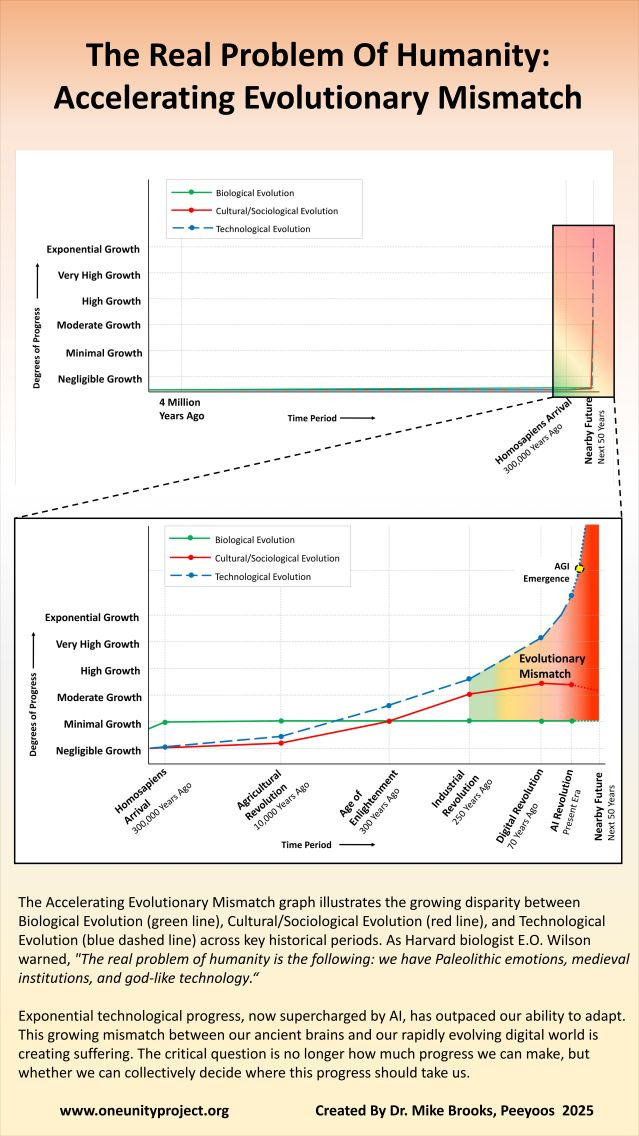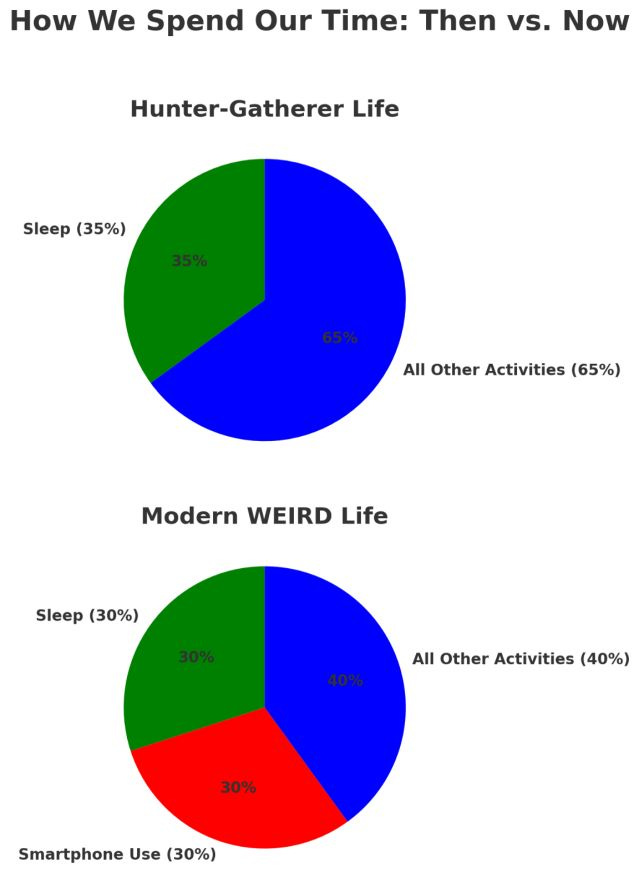Letter 4 Resource: Link to Article
We're suffering because we've created a world that we didn't evolve to inhabit.
Key points
Our brains evolved for a simple world. Rapid technological progress is overwhelming our biology.
The attention economy exploits ancient reward circuits, shackling us to our phones for profit at our expense.
True happiness depends on unity and relationships, not wealth, fame, power, or screen-mediated experiences.
In an ironic twist, we could choose to use AI to help us overcome tribalism and mismatch. It's up to us.
"Insanity is rare in individuals—but in groups, parties, nations, and epochs, it is the rule." –Friedrich Nietzsche
Something feels profoundly wrong with our world, doesn't it? That constant knot of anxiety as you scroll through endless feeds. The creeping sense that the Treadmill of Life keeps accelerating beyond your ability to keep pace. These aren't random anxieties—they're symptoms of Accelerating Evolutionary Mismatch, the growing gap between our ancient brains and our rapidly changing digital world. The madness we collectively feel isn't an illusion—it's the most natural response to an increasingly unnatural world.
As Marie Curie reminded us, "Nothing in life is to be feared, it is only to be understood. Now is the time to understand more, so that we may fear less." We must understand what's happening to us.
A Diagnosis for Our Modern Madness
What's wrong with our world is this: We've progressed too quickly for our own good. We are running godlike software on Stone Age hardware. Harvard biologist E.O. Wilson captured our predicament perfectly: "The real problem of humanity is the following: we have Paleolithic emotions, medieval institutions, and god-like technology."
This accelerating evolutionary mismatch provides the most comprehensive framework for understanding the suffering we're experiencing on both individual and societal levels. The equation is devastatingly simple:
Greater Progress = Greater Evolutionary Mismatch = Greater Suffering
Source: Mike Brooks & Peeyoos/original work
Our ancient brains, which evolved for linear, predictable change, now face exponential technological acceleration. This widening gap between our biology and technology grows daily, creating unprecedented strain.
"The greatest shortcoming of the human race is our inability to understand the exponential function," physicist Albert Bartlett warned. In other words, our brains evolved to detect immediate threats like predators, not exponential technological change. This makes us blind to the very forces transforming our world.
We've Created a World We Didn't Evolve to Inhabit
We've moved from lives that were simple but brutal to lives that are complex but effortless—an evolutionary upheaval so vast our brains haven't evolved to comprehend it.
Think of your five biggest stressors right now. Would a hunter-gatherer 300,000 years ago have faced any of them? If not, you're experiencing evolutionary mismatch. First-world problems aren't trivial—they feel overwhelming precisely because we never evolved to handle them.
Just as human activity has created climate change, our digital world has triggered psychological climate change. Our mental landscape is transforming faster than we can adapt. Toxic emotions spread virally, altering our psychological climate at unprecedented speed.
This rapid psychological shift reveals why even the luxuries of modernity are psychological dead ends. Simply put, our brains did not evolve to derive lasting happiness from experiences our ancestors never encountered. That's why research consistently shows that close relationships—not wealth, fame, or stimulating screen time—are what keep us genuinely happier and healthier throughout life.
The Titanic Humanity Crisis
With our relentless pursuit of progress at all costs, we are like passengers aboard Titanic Humanity, accelerating exponentially into icy waters with no clear navigation system. The algorithms of the attention economy, which monetize division and outrage, have damaged our shared perception of reality. We're so distracted by comfort and infighting that we're oblivious to the icebergs dead ahead.
As Martin Luther King reminded us, "We may have all come from different ships but we are all in the same boat now." The question is no longer whether we are all in the same boat—but whether we will sink together on Titanic Humanity or change course in time.
The Digital Dopamine Trap
Give a rat a lever that stimulates its brain's pleasure center, and it will press it endlessly—ignoring food, water, and sleep until it collapses. Now, imagine that lever is your phone.
Like the rat pressing the lever, we keep scrolling—because artificial intelligence (AI) has turned our attention into the most valuable currency on the planet. Algorithms don't exist to enrich our lives—they hijack our brains and sell our focus to the highest bidder. Digital platforms don't sell truth—they profit from our attention.
Consider this dramatic shift: Until smartphones emerged about 20 years ago, we spent zero time on these devices. Now, Americans spend four to six hours daily on smartphones—30 to 40 percent of our waking hours. Simultaneously, we've gone from spending most of our time connected to nature throughout human history to many of us spending virtually zero hours immersed in it.
In WEIRD (Western, educated, industrialized, rich, democratic) societies, people spend about 25 to 30 percent of their waking hours on smartphones—a radical shift from our evolutionary history. Hunter-gatherers spent days physically active, socially connected, and immersed in nature. Today's dramatic shift fuels evolutionary mismatch, intensifying modern anxiety, loneliness, and unhappiness.
Source: Mike Brooks, DALL-E / OpenAI
This radical transformation of our daily experience has consequences far beyond individual screen time. As we collectively struggle with this unprecedented shift, we make a critical perceptual error.
The Misattribution of Our Suffering
The true insanity of our age is this: We suffer from the same mismatch but blame the dreaded "other side" rather than recognize its true source. Conservatives keenly feel the strain of exponential change, longing for a slower world. Progressives embrace technologies for social causes, not realizing these same tools fracture our shared reality.
"We've become captives of a system that has forgotten how humans are meant to live," Daniel Quinn wrote in Ishmael. We find ourselves trapped—two warring tribes burning down our shared house. It's as if our right arm attacked our left—forgetting that they both belong to one body.
Our Evolutionary Crossroads
As AI washes over humanity, we approach an evolutionary tipping point: Humans will soon no longer be Earth's most intelligent species. This unprecedented moment asks: Will we rise to the challenge and use AI to magnify the best in us? Or will we harness its immense power for unimproved ends—the pursuit of power and wealth—that could ultimately lead to our downfall?
As spiritual teacher Eckhart Tolle warned: "The insanity of the collective egoic mind, amplified by science and technology, is rapidly taking our species to the brink of disaster. Evolve or die: that is our choice now."
The Truth That Lights Our Way Forward
Our sense that the world is going mad isn't a misperception. It's a warning that Titanic Humanity is racing headlong into countless icebergs. We must heed the warning signs. Our most skillful path forward into our collective future is together.
The challenges of our modern world necessitate a much greater level of unity than humanity is currently demonstrating. We cannot solve collective problems using divided approaches in an interconnected world. In this light, hatred is evolutionary and a spiritual failure.
True wealth isn't measured in billions, bitcoin, power, or position—it's measured in love. Our greatest evolutionary challenge is that our survival requires unity. This means that we must transcend tribalism. We are here to choose love over hate, compassion over selfishness, and unity over division—even though we have the free will not to.
What if, instead of algorithms that profit from our division, we created AI as a corrective lens—helping us see beyond our tribal biases to the truths that unite us? What if we trained AI not to exploit our ancient fears but to help us love our neighbors as ourselves?
Humanity stands at a crossroads unprecedented in history. Will we steer our Titanic Humanity toward the safe harbor of unity, or will our divisions chart a course to disaster? The choice between love and hate will determine our fate.
We must choose unity over division. We merely need to live this truth to set ourselves free—our survival depends on it.
For a more comprehensive exploration of Accelerating Evolutionary Mismatch and its implications for our collective future, visit the full version of this article where I expand on these concepts and explore potential paths forward.
Explore with AI
Copy the link to this article and share it with your favorite AI assistant (like ChatGPT, Claude, or Gemini). Then ask:
"To what extent does accelerating evolutionary mismatch explain the patterns of suffering we're seeing in modern society—from rising anxiety and addiction to political polarization and social disconnection?"
Compare the responses across different AI systems. See how this framework helps illuminate the root causes of our most pressing individual and societal challenges.
About the Author
Mike Brooks, PhD, is a psychologist who specializes in helping parents and families find greater balance in an increasingly hyper-connected world.




